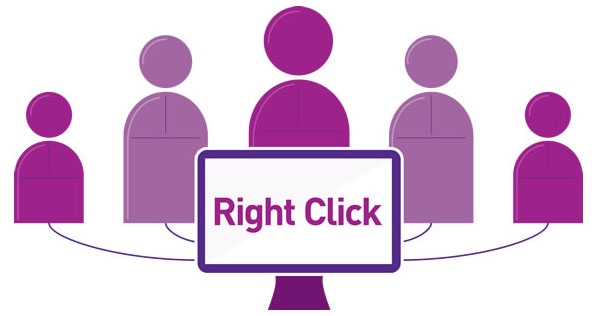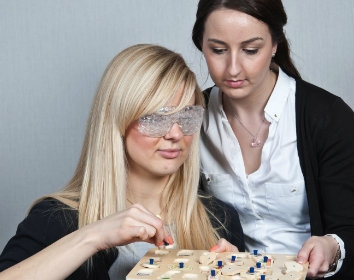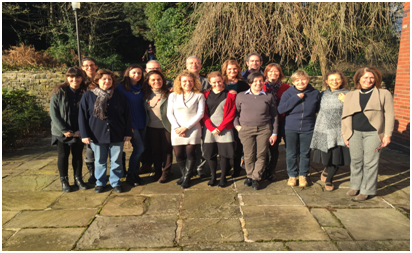Why Participate in Research?
Dr. David Simmons
A Researcher's View
In a few weeks' time, a small army of autism researchers will descend on Salt Lake City, Utah, to attend the International Meeting for Autism Research (IMFAR) and share their latest research findings. Of the research presented, all but a small proportion of it will have involved participants from the autism community in some form: either by donating their time, the brain tissue of their deceased relatives or their genetic information.
Our research group works on psychological aspects of autism, and one of the key challenges for us is involving participants in our research. There are many checks and balances in place, including at least one and sometimes two levels of ethical review (in our case at the University and NHS levels) before we are allowed even to approach potential participants with autism. What then follows is the equally challenging task of persuading these participants, and often also their families, to give up some of their precious time to take part in our experiments. Sometimes this will simply involve filling in a questionnaire, but at other times more lengthy procedures like undergoing a diagnostic interview, or having a brain scan, will be required.
Why should you bother?
A complaint that I have heard a few times from members of the autism community is that, despite the huge amount of autism research going on worldwide at the moment, very little of actual worth has been achieved. Whilst it is true that the evidence base for interventions, for example, is still rather poor, my view is that we have made great strides in terms of understanding the genetic basis and the neuroscience of autism, and there have been other notable successes, such as demonstrating that some forms of therapy are ineffective (e.g. Facilitated Communication Therapy). As most of the readers of this article will appreciate, autism is a hugely complex and variable condition. This complexity makes it a fascinating research topic, but also very difficult to study, so it is going to take considerable time and a lot of resources to reach an adequate understanding of it.
Another common complaint, highlighted by the recent report “A future made together” is that only a small proportion of autism research currently funded focuses on issues of direct relevance to the autism community, like services. To try and address this funding gap, an increasing trend is to involve the autism community not only in the participation aspects of the project, but also in the planning phases. This practice helps to identify opportunities to translate research into practice at an earlier stage. I myself am on an advisory panel to the Autism Spectrum, Adulthood and Ageing research project based at the University of Newcastle which is aiming to build up a large cohort of adults with autism across the UK to investigate the ageing process. This has grown out of the ASD-UK project which has been focused more on children. In Scotland we are planning to partner with these researchers to build our own Scotland-wide participant community in the near future, which we hope will help to coordinate and focus our research efforts across the country. We also plan to employ the same participatory model, with the autism community engaged in every stage of the research process.
A particular challenge for autism researchers is how to communicate their research findings in a way that is understandable to the general public, and giving timely feedback to their research participants. Universities and funders of research across the world are putting much more emphasis on “public engagement” skills (in fact, you could say that this article is in itself a result of that, although I like to think I would have written it anyway!).
Also, various nationwide initiatives are trying to address this problem, including the re-launched Scottish Autism Research Group and Autism Network Scotland, as well as Scottish Autism and many other smaller charities and local organisations. Participation in research by the autism community is extremely important, because understanding the complexities of autism is the key to developing effective and useful support. Researchers are working hard to engage more effectively with the community and are trying to translate the results of their research into helpful developments as soon as they can. One thing that I should mention finally is that participation in experiments can be an enjoyable and informative process (see the associated article by E.G. Douglas). Please take advantage of these opportunities to help us progress autism research together.
A Participant's View
By E.G. Douglas
Aside from the personal benefit of taking part (I got to see my brain!), I would say that participation in these types of studies is important, for both autistics and not, in trying to understand what autism is and how it manifests, and thus how measures can be developed and enacted to make life easier for us all.
That autistics have advantages and strengths is something I not only believe but experience, living with it. However the difficulties we face are also not insignificant. Trying to mitigate the one whilst applying the other is daunting, and not something that regular people can be expected to devote time to figuring out; they have their own troubles after all. But with knowledge, ways to allow autistics to contribute and thrive can hopefully become apparent.
If that’s all a little too idealistic though, there is another reason that I considered: being a part of our own situation. Some, but few, of the researchers studying autism are themselves autistic, and we should be grateful for people who want to understand and help us. But at the same time, we have a certain perspective on living with autism that cannot be understood from the outside, and could be of use. Helping the effort to understand our condition makes sense, and allows us to contribute perspectives and points of view that can help correct mistaken assumptions and prevent wasted time and attention. It also helps us establish ourselves as people, with differences, rather than sufferers of disability, and that helps not only those of us who happen to be High Functioning but also those autistics who are less able to communicate and live by themselves.
RESOURCES AND LINKS
International Meeting for Autism Research (IMFAR) Pellicano, E., Dinsmore, A., & Charman, T. (2013)
A future made together: shaping autism research in the UK. London: Institute of Education.
Autism Spectrum, Adulthood and Ageing research project:
Autism Spectrum Database website





